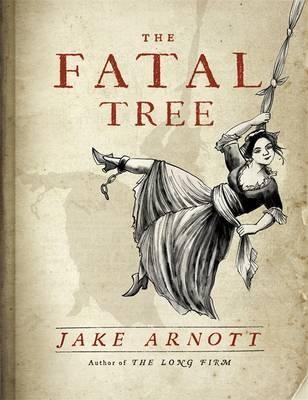Novelist Jake Arnott has an eye for seedy glamour. The Fatal Tree takes the 1720s underworld - the setting of John Gay’s The Beggar’s Opera, one of the most successful of all time - and adds more sex and a slick story, to make this rivetingly vivid tale. Having established himself as pre-eminent gangland chronicler with the trilogy that began with The Long Firm (1999), he moved onto Seventies glamrock, and Belle Epoque Paris. Here, he has a situation so pungently evocative, it’s as if a character in the background of a Hogarth sketch has come suddenly to life.
The Fatal Tree is narrated alternately by prostitute Edgworth Bess (born Elizabeth Lyon), who speaks in dialect, and William Archer, a gay writer with a more neutral register. Bess’s vocabulary has been researched carefully, and Arnott includes a fascinating glossary of criminal slang, as well as a lengthy bibliography. The pair offer effectively complementary perspectives as narrators, though Bess’s voice very occasionally jars and clunks. Compared, say, to Peter Carey’s re-creation of period criminal dialect in True History of the Kelly Gang, her narrative has a few Google-translate moments of oddly mechanical syntax.
As in previous works, Arnott blends historical characters with fictional to good effect. Bess is historical, though little is known about her. Archer is made up, but details of his life are based on some historical gay writers of the period. Thief and gaol-breaker Jack Sheppard is, of course, much more familiar, and was treated by contemporary writers, most notably John Gay, whose character of Macheath in The Beggar’s Opera was based on him. Thief-taker (essentially a mob moss) Jonathan Wild is also well known.
 Bess begins life serving an aristocratic family in Middlesex, but is expelled when the son of the house beguiles her into bed and she is blamed by the boy’s mother. Making her way to London, she immediately falls into the society of the Hundreds of Drury, a notorious home of thieves and prostitutes. Although both Bess’ seduction is similar to Thomas Hardy's Tess of the d’Urbervilles, Tess and Bess are, psychologically, worlds apart. Conned of both her virginity and livelihood, Bess resolves without further ado to wreak revenge on the hypocritical gentry. As a narrator and guide, Bess is terrific company, full of lust, mischief and schemes, but her world view contains few spiritual depths, hidden or otherwise.
Bess begins life serving an aristocratic family in Middlesex, but is expelled when the son of the house beguiles her into bed and she is blamed by the boy’s mother. Making her way to London, she immediately falls into the society of the Hundreds of Drury, a notorious home of thieves and prostitutes. Although both Bess’ seduction is similar to Thomas Hardy's Tess of the d’Urbervilles, Tess and Bess are, psychologically, worlds apart. Conned of both her virginity and livelihood, Bess resolves without further ado to wreak revenge on the hypocritical gentry. As a narrator and guide, Bess is terrific company, full of lust, mischief and schemes, but her world view contains few spiritual depths, hidden or otherwise.
Arnott fleshes out his tale’s historical context with bold, deft strokes, giving us just enough to make sense of the action without ever straying into history textbook territory. The South Sea Bubble is tumescent, Grub Street is a-buzz, and Daniel Defoe one of the most prized ghost-writers of the criminal autobiographical pamphlets widely sold at hangings. (He probably wrote the story of Sheppard’s life that Arnott has used here.) The poet John Gay patronises Archer - and was, after Defoe, one of the first professional authors to tell Sheppard’s story.
Arnott’s relationship with the mass-market end of gangster lit (and its cinematic twin, the Ritchie oeuvre and the like) is complex. Arnott’s fiction is scrupulous about telling otherwise neglected stories. He’s always drawn out the gay experience very evocatively, whether of the Krays and their milieu, as in his gangland trilogy, or later in the hinterland of glam-rock in Johnny Come Home. Here, the scenes in the molly houses are terrific, and the fate of gay men shocking: sodomy was a capital offence. Yet this is still, essentially, fiction in which narrative trumps artifice: pockets are picked, bodices ripped, and Bess’ colleagues hung (or killed by a disease they catch in prison) at (literally) breakneck pace. It works because Arnott does it so well. Entertainment is paramount, but is richly invested with fascinating historical detail. One wonders if he has his eye on cinematic adaptation. It would work a treat.
For readers of contemporary fiction, Arnott’s vigour, frankness and immediacy, in a historical setting, is very refreshing. In places The Fatal Tree is reminiscent of a more politically sensitive version of George MacDonald Fraser’s Flashman novels. From a literary-historical point of view, he is hasn’t so much created a new genre as blown the dust off the Newgate novel, a popular kind of sensational criminal fable in vogue in the early 19th Century, of which William Harrison Ainsworth’s Jack Sheppard is a pre-eminent example. Rarely has such a delicious romp also felt so worthwhile.
- The Fatal Tree is published by Sceptre
- More book reviews on theartsdesk















Add comment